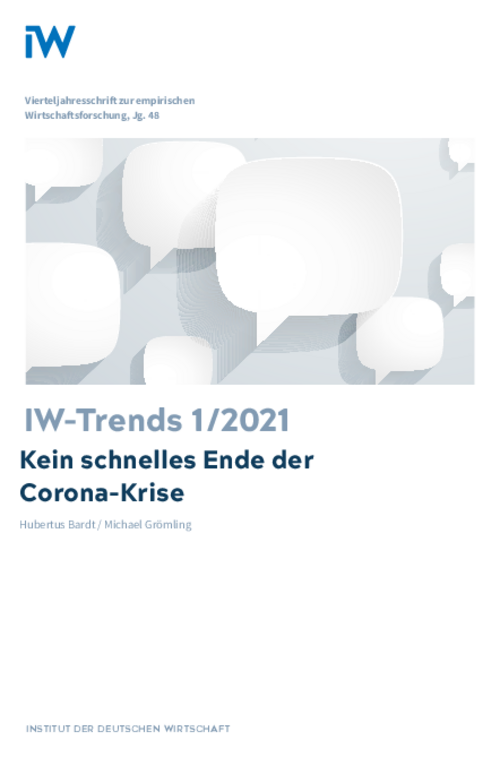Although a number of economic indicators are suggesting that 2020 ended with a strong recovery following the sharp downturns in the spring, the return to a normal business cycle in Germany is likely to be slow in coming.

No Quick End to the Corona Crisis: Gaps in Medium-term Production, Employment and Investment in German Industry
IW-Trends

Although a number of economic indicators are suggesting that 2020 ended with a strong recovery following the sharp downturns in the spring, the return to a normal business cycle in Germany is likely to be slow in coming.
When measuring and interpreting output gaps, it is important to bear in mind that German industry has actually been in reverse gear since the end of 2017, and in recession since mid-2018. In the fourth quarter of 2020, industrial production was still around 9 per cent below the annual average for 2018. The IW Business Survey asked firms about the production, employment and investment gaps they were expecting. In November 2020 both service providers and manufacturers were already predicting an increase in their output gaps for the first half of 2021. By 2022, the gaps in manufacturers' production, employment and investment will have closed significantly, although half of them expect production shortfalls to continue in 2022. Those industrial firms reckoning with reduced production in 2022 put the size of their output gap at around 5 per cent. The largest gap will be in investment, at just over 6 per cent. The employment gap in manufacturing is likely to be some 4 per cent – provided the recovery is not jeopardised by a deterioration in price competitiveness.

Hubertus Bardt / Michael Grömling: Kein schnelles Ende der Corona-Krise – Mittelfristige Produktions-, Beschäftigungs- und Investitionslücken der deutschen Industrie
IW-Trends

More on the topic

Working with Long COVID: Impacts and Options for Work Arrangements
A SARS-CoV-2 infection can have long-term health consequences, a phenomenon commonly known as Long COVID, which often affect individuals of working age.
IW
Fertility Response to the COVID-19 Pandemic in Developed Countries: On Pre-pandemic Fertility Forecasts
The COVID-19 pandemic has affected all areas of our lives. Among other outcomes, the academic literature and popular media both discuss the potential effects of the pandemic on fertility. As fertility is an important determinant of population development and ...
IW